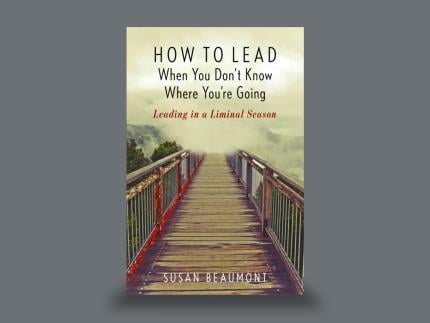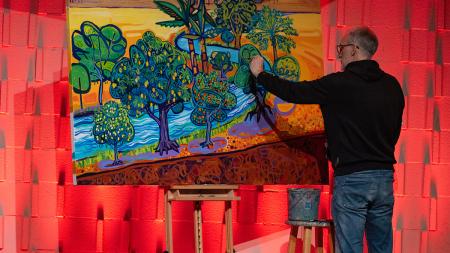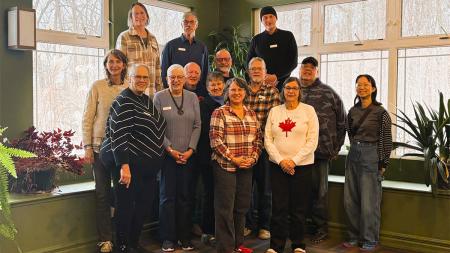A Time to Pause and Listen

Even though a range of complex questions and challenges face the Christian Reformed Church in North America and other churches today, now is not the time for congregations to come up with major strategies and detailed plans for the future, said Syd Hielema, director of the CRCNA’s Connections project, which aims to help connect congregations to the resources available to support them.
Now is the time for many church leaders to pause, set aside their normal frantic pace, and listen to what the Holy Spirit is saying to them, Hielema explained.
“Many of us need to change our orientation and pay attention to what the Spirit is calling us to do. This is a time for silence because we are in a liminal season.”
Liminal refers to being in an uncertain, in-between space. With regard to the life of the church, this is an ambiguous place where traditional ways of worship and ministry are going away and a new, uncertain future is emerging.
“This ought to be a time for discernment and contemplative prayer. We can be so rational in our decision making. But we also need time to listen and pray to help us learn how Jesus is at work in the community.”
In order to help churches better understand what it means to be in a liminal space, Pastor Church Resources has given out more than 200 copies of the book How to Lead When You Don’t Know Where You’re Going: Leading in a Liminal Season by Rev. Susan Beaumont.
In the book, said Hielema, “Beaumont describes liminality as a season in which familiar realities have ended and new landscapes have not yet emerged.”
The CRCNA, he added, is currently processing six layers of liminality: the unsettledness of the COVID-19 pandemic; discussions about the Human Sexuality Report on the agenda for Synod 2022; two canceled synods; turnover in executive leadership positions; Canada/U.S. relations; and significant divergences around the issue of racial reconciliation.
“It’s no wonder that so many pastors and CRC staff are drawn both to reading this book and to sharing their reading experiences with others,” said Hielema.
The book is also significant, he said, because it supports the goals of the CRC ministry plan, Our Journey 2025, so well.
“One of Beaumont’s central theses declares that this liminal season calls for practicing discernment prayer as part of our decision-making processes,” said Hielema.
“Her call resonates completely with Milestone 1 of Our Journey 2025, which has emerged as the foundational milestone during this liminal season.
“Second, the ministry plan states that leadership development is embedded in each of the four milestones of Our Journey 2025, and her emphasis on equipping leaders to navigate the wilderness is timely and encouraging.”
Over the past several months, Hielema and others have held a series of one-hour, online conversations for pastors and other leaders who have received the book so that they can discuss the book with others.
“We have had rich conversations with pastors and others during these conversations. This is a place to give voice to their concerns and things they are wondering about,” said Lesli van Milligen, a Faith Formation Ministries regional catalyzer in eastern Canada.
During these Zoom conversations, she added, participants are asked to respond to such questions as “What specific insights in this book are serving to shape your leadership in ministry?”
To date, said Hielema, 85 pastors and CRC staff have participated in the one-hour conversations. And several pastors, in turn, have assigned the book to their council or executive or visioning team.
As one pastor wrote, said Hielema, “We bought copies for all council members. We admitted that we're not the church we once were, and we're not yet the church we will become, and we are in the wilderness.
“We’ve dedicated the coming months to moving everyone into the wilderness where God can shape us into the church he wants us to become.”
Curtis Korver, pastor of Alberni Valley CRC in Port Alberni, B.C., has looked through the book and will likely attend a conversation that will take place in western Canada in January. He said that in going through the book, he realized that it can help tell the story and define the challenges facing his church.
“We are in the wilderness. We can’t always count on having children in our ministry; we can’t assume people will keep coming and joining our church,” he said.
Like many churches, Alberni Valley is seeing its membership grow older. In the past, said Korver, the church could engage more enthusiastically in various ministries, which would draw people from the community, but this is no longer the case.
“In the past, you could put out your CRC shingle and count on growth. No longer,” Korver said.
As he thinks of making changes at the church, Korver said he is considering the fact that Port Alberni is home to many Indigenous people, and that this is a group that his church has not sought to connect with in any substantial way in the past.
Almost as a reminder of this, there is a totem pole with carved Indigenous images on it that was installed not far from his church. Church members can easily see the pole as they come in and out of church.
Dedicated in September, the totem pole, says the newspaper The Times Colonist, “was carved to send a message to young people about language, culture and the importance of taking care of the planet. On top of the 10.7-metre-tall pole are two figures showing the first man and the first woman. The other side of the pole includes images of the sky, crescent moon and sun.”
The newspaper also says: “Carver Tim Paul, a member of the Hesquiaht First Nation with the Nuu-chah-Nulth people, said the pole represents the importance of culture, nature, family and history, and also sends a message that humanity needs to work together to make changes to protect and clean up the environment.”
One of the values of Beaumont’s book, said Korver, “is that it gives us the language to know and express where we are at. . . . There is the blunt realization that we can’t fix what is happening.”
However, there is comfort in knowing that if you slow down and pay attention to God, the Lord will show the way forward. Although this can be an uncomfortable process, Korver explained, it can lead to results — to a new life that can arrive after you have been wandering in the wilderness.
“This process is something we need to stay with,” said Korver. “We can’t get distracted. We have to stay on this trail.”
Also of comfort, he added, is holding on to Reformed theology, which offers something secure on which to stand.
“By reading, paying close attention to, and following Scripture, the church — even though it is right now in the liminal wilderness — has something straight and true that we can rely on,” said Korver.
For more information, listen to a 30-minute clip from Vibrant Conversations in which Beaumont talks about her book.


